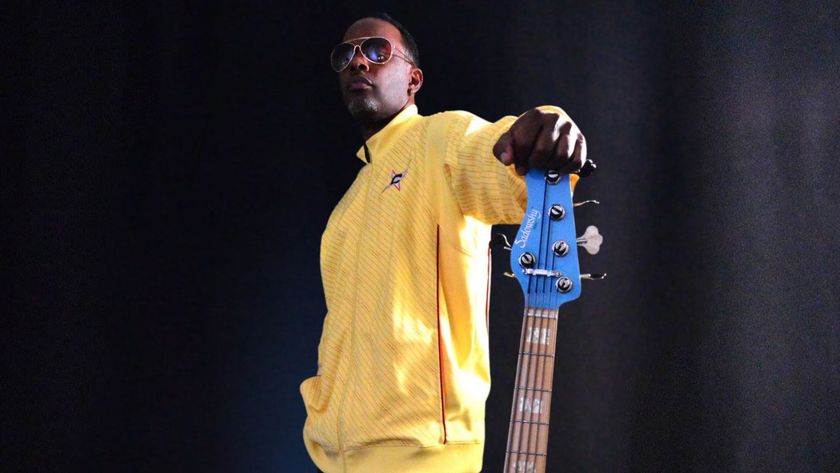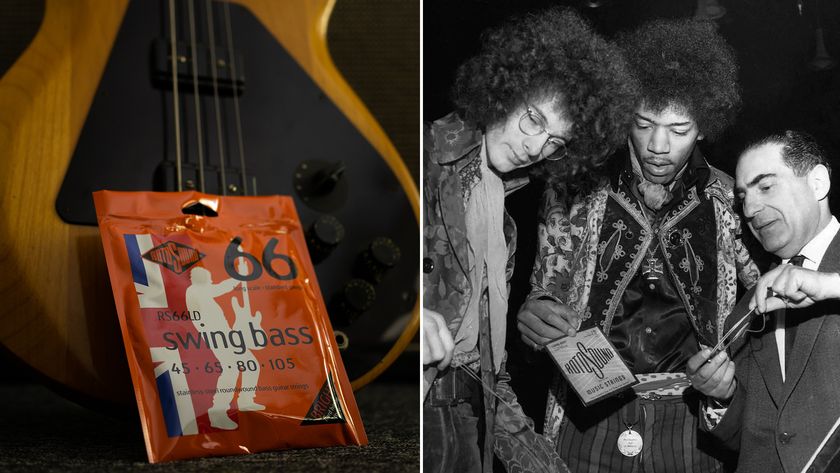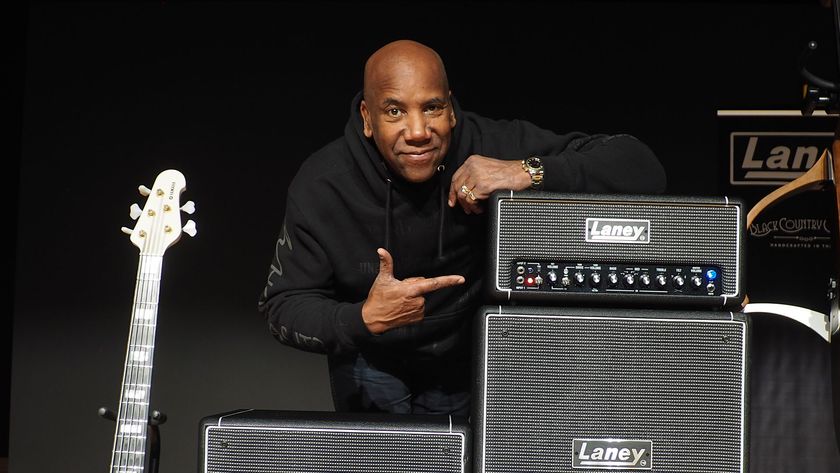“We tune to C#, which creates sourness. It’s not a tuning a lot of guitarists want to stay in – it’s kind of out of tune. We create something evocative in that dissonance”: How Sleater-Kinney use guitar as an agent of beauty and chaos
Carrie Brownstein and Corin Tucker strive to create a sound that’s “out-of-tune-adjacent” – and they use their opposing playing styles and “corrosive” pedals to channel tragedy and joy

Over 30 years, Sleater-Kinney, led by Carrie Brownstein and Corin Tucker, have released 11 studio albums awash with sonic bombast and unladen emotion.
The latest of those is Little Rope, launched in January. From the jump, the record is an illustration of the torrents of passion, ardor, fervor and vehemence via Brownstein and Tucker’s guitars. It’s blissful yin/yang, described by Brownstein as “intentionally creating a sound that’s out-of-tune-adjacent”.
Indeed, Sleater-Kinney enjoy oscillating between “sour-sounding notes” and “in-tune moments,” which could be confusing for some, though not all. “We love those sounds,” Brownstein tells Guitar World. “But I also want to veer toward joyous sounds. That sort of thing spoke to me during this record – meaning that spectrum of life.”
She continues: “I lost my mom while writing Little Rope, and certainly that informed how I approached the songs. But myself, Corin, and the rest of the world were already grappling with the broader cultural and societal situation we find ourselves in, which often feels dire and dark anyway.”
Tucker is often in stark stylistic contrast from Brownstein, adding urgency while scrawling her distinctive vocals across Sleater-Kinney’s tracks. “I’m more likely to use the guitar to set up a melody for my voice,” Tucker says. “That’s when I’m at my strongest.
“My voice is my strongest instrument – the guitar is sometimes more of an accompaniment, whereas I think Carrie’s guitar playing is more about having a true shredding riff.”
The band’s cohesion is built on inherent tension: while it’s evident the duo are deeply bonded, it’s their differences that elevate their music. “The guitar is a wondrous instrument,” Brownstein says. “I like to use it to bring out the essence of a song through a melody and thicken it.”
Get The Pick Newsletter
All the latest guitar news, interviews, lessons, reviews, deals and more, direct to your inbox!
“If I can make a song rubbery by adding some chorus or delay, and then some distortion that cloaks the guitar in corrosive elements, leading to total break-up, that’s my number one means of having a musical conversation with Corin.”
Tucker agrees: “We give ourselves the freedom to use several methodologies to balance what Carrie and I feel is essential Sleater-Kinney guitar rock. It can be something we’ve done – but more often than not it’s doing something new and interesting together with each album we make.”
That checks out in new tracks like Hell, Needlessly Wild and Untidy Creature, demonstrating what Brownstein calls “balancing chaos with melodies to punctuate something that sounds messy.”
She explains: “I love intrusion in our music. The guitar can either sit back and be what momentarily beautifies something; or more often be a weapon, which is a staple element in Sleater-Kinney’s songs.
“We’re often trying to vacillate between what we know and exploring what is possible. It could be gear, arrangements or maybe not being pure and strident. We always think in terms of less being more because I can be loquacious and use a lot of notes. It’s important to hold back and look at the songs with sickness, terseness and angularity.”
I love intertwining lines that show up, make their point, and get out. I love playing with space, leaving a void, and filling it in with something indelible
Carrie Brownstein
With yet another triumph in Little Rope, Brownstein and Tucker have put rumors of walking away to bed. And fans have been loving it – which is a relief, given the emotional toll it took. “It’s always reassuring,” Brownstein says. "We feel very grateful for the old and new listeners that seem to be jumping on board.
“Next we’ll be touring,” she adds. “Now we get to take songs that have been codified and formalized in the studio, break them open and get them looser. We love moments of improvisation, where we can make our songs bigger and connect with the audience each night. That’s what we value most.”
A lot has happened in the world of Sleater-Kinney leading up to Little Rope. Catch us up.
Carrie Brownstein: “Coming out of the pandemic era, the last record, Path of Wellness, felt insular and isolated. As we set out to make a new record, we were looking to create a song landscape that was a little more extroverted, unruly, corrosive, gritty – basically all the things that are fundamental to Sleater-Kinney.”
And you had some personal tragedy, too.
Brownstein: “Yes. As we started writing the record and had a handful of songs, I lost my mom in a car accident. I think that colored the tenor of this record and raised the stakes on everything.
“It was obviously a time of grief and uncertainty, and I wanted the album to be big, bold and tender enough to hold all the emotions, while providing the listener with something honest and raw.”
Little Rope sonically hits in a way that’s quintessentially Sleater-Kinney, while creating guitar sounds that feel fresh. How did you approach that?
Corin Tucker: “We’re different players – we’re opposite in terms of guitar playing. I try to use chord progressions to move a chorus along in a certain direction, and Carrie is more of a riff-based player. But we complement each other as we use different methodologies on guitar.”
Brownstein: “I think of the guitar as a means of expressing myself and my feelings. I love the emotive quality of the guitar, how it mimics the human voice, and how you can bend the notes – those are things that make the guitar unique.
“You can happen upon something that is slightly discordant and slide into something that sounds melodic. It’s all in how you approach it; the guitar is humanistic, so you can approach it aggressively or with tenderness.”
When you have something that’s a known or learned process, you must unlearn it, then to get to a place of imagination and innovation
Carrie Brownstein
Still, Sleater-Kinney has an established sound, and there’s no stripping that away. How do you balance what’s expected with being explorative?
Tucker: “We like to experiment a lot when we’re writing, to try and mix things in. Sometimes we’ll start a song on guitar by jamming, but other times we’ll go into a computer program and start somewhere else.
“It could be a rudimentary synth part and adding a guitar or something else. We try to add different voices, and even if it ends up on guitar it might start somewhere else, which leads to fresh things.”
Brownstein: “We have an established template. Part of that is we tune to C#, which creates sourness. It’s not a tuning a lot of guitarists want to stay in – it’s kind of out of tune. We’ve figured out a way to utilize those moments to create something evocative in that dissonance. We vacillate between that and something in tune, which is more palatable.
“When you have something that’s a known or learned process, as a songwriter and craftsperson you must unlearn it, then to get to a place of imagination and innovation. That’s where Corin and I can finally deviate from the routine and be genuinely experimental.”
What gear did you lean on most while making Little Rope?
Brownstein: “I was going for very gritty, gated tones, and I used my Korg PX Pandora stompbox a lot. Those are some squirrely pedals, and if you adjust the knobs just right, you can get sounds that corrupt things in a way that I like as they break apart.
“That sound was brighter than I’m used to, but because we have a lot of low end on this album with Corin's guitar – and using a synthesizer for bass – that allowed me to use the high end in an effective way. It really cut through and it was grating, and opposite of a harmonizer or chorus effect.
“I also like Chase Bliss and Eventide pedals, and I love using old tape echo machines. As for amps, I mostly stuck with my Fender ’65 Deluxe Reverb reissue, but I also love my little Fender Princeton for lightening up a super low-end and making that a bit overdriven.
“I still use my original Klon Centaur for grit and an EarthQuaker Devices Talons high-gain overdrive. And I’ve got an old Maestro Fuzz that I’ve rehoused, because the old version was giant to the point of being like a skate ramp. I still love fuzz; it’s a huge part of my wheelhouse, but I’m strict about incorporating it.”
There are a lot of subtle, repetitive things I do… then Carrie’s guitar will come in on the chorus adding this uplifting melody
Corin Tucker
Tucker: “I have a Fender Showman head that’s a lot like a ’65 Black[-panel], and I love it – it gives my guitar this big, huge, fat sound. I play a Gibson Les Paul, and Carrie gave me a very nice Les Paul Goldtop that I played on this record. It’s super round-sounding with a thick tone, and it was a perfect contrast to Carrie’s sharper tones.
“The distorted sounds she got with the PX Pandora – as she said – came through the grittiest and grimiest settings, so my sounds are kind of underneath things. But they’re always very apparent because I like them to be grisly and grim, with these deep undertones. Those are the kind of tones I was going for, with the Les Paul and the Showman.”

Brownstein: “I guess I forgot to mention the guitars I actually play! I really like my Guild, and the S-100 has a great vibrato bar. It’s a very crunchy guitar, which lends itself to Sleater-Kinney very well. And I must admit, I love my '72 Gibson SG, even though it’s from the dubious Norlin era – I think it sounds great.
“There’s a guy named Reuben Cox [often referred to as the ‘junk luthier’] in LA, who builds guitars the old-style way. I have a semi-hollow from him which I like. I’m always looking for thick, dark tones – but boosted, like mixing in a little high-end. That’s good, as Corin occupies so much low-end.”
Which songs from Little Rope represent what you two do best?
Tucker: “Say It Like You Mean It is the one for me. I had a basic rhythm guitar line that I built a vocal around, but this sort of lilting sound that I did with the guitar turned into what you hear on the record.
“There are a lot of subtle, repetitive things I do with the guitar that I build the songs with, and then Carrie’s guitar will come in on the chorus and it’s huge, adding this uplifting melody.
“That’s how it is on Say It Like You Mean It. I like the additional emotive layer outside the darkness, as that riff brings a sense of optimism.”
Brownstein: “I have two examples. One is Untidy Creature – it starts with this lead riff of mine, and then Corin matches my energy on guitar with her vocals. We’ve always spoken back and forth within songs like that: me through guitar and her responding with a vocal melody.
“Then there’s Six Mistakes, which I wrote these kinds of Devo-like riffs for, and it was very austere. But I wanted to make it more sinister. It had heaviness, but I wanted to make it groove.
People seem to hear and see themselves in the songs…maybe they need music like this too
Carrie Brownstein
“It needed something over the top, so a series of leads came and went throughout, which is how I like to play. I love intertwining lines that show up, make their point, and get out. I love playing with space, leaving a void, and filling it in with something indelible.”
The returns are early, but Little Rope has resonated deeply with listeners. That has to be gratifying.
Brownstein: “People seem to hear and see themselves in the songs. I think they can feel and hear the energy and the urgency, and our guess is that they’re experiencing – for whatever reason – those same sorts of things in their own lives, and maybe they need music like this, too.”
- Little Rope is out now. See Sleater-Kinney.com for tour dates.
Andrew Daly is an iced-coffee-addicted, oddball Telecaster-playing, alfredo pasta-loving journalist from Long Island, NY, who, in addition to being a contributing writer for Guitar World, scribes for Bass Player, Guitar Player, Guitarist, and MusicRadar. Andrew has interviewed favorites like Ace Frehley, Johnny Marr, Vito Bratta, Bruce Kulick, Joe Perry, Brad Whitford, Tom Morello, Rich Robinson, and Paul Stanley, while his all-time favorite (rhythm player), Keith Richards, continues to elude him.
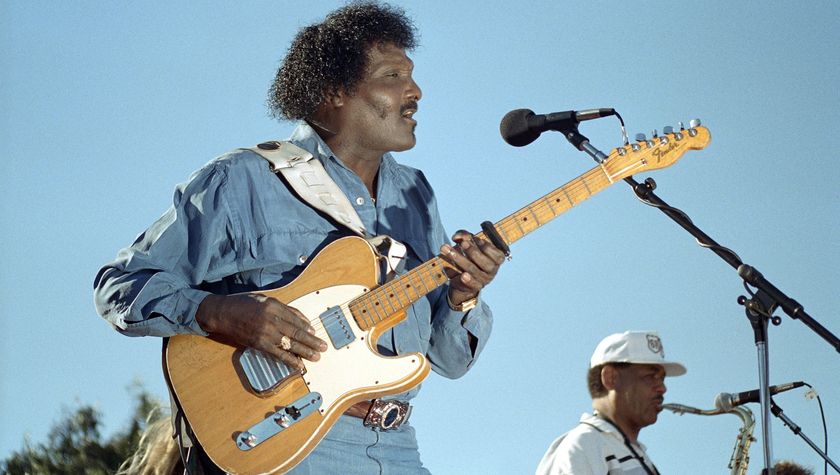
“Freddie King would ask me why I never tried using thumbpicks – I just couldn't play with one”: He took Jimi Hendrix's place in Little Richard's band, was idolized by Stevie Ray Vaughan, and is one of the most overlooked Telecaster slingers of all time
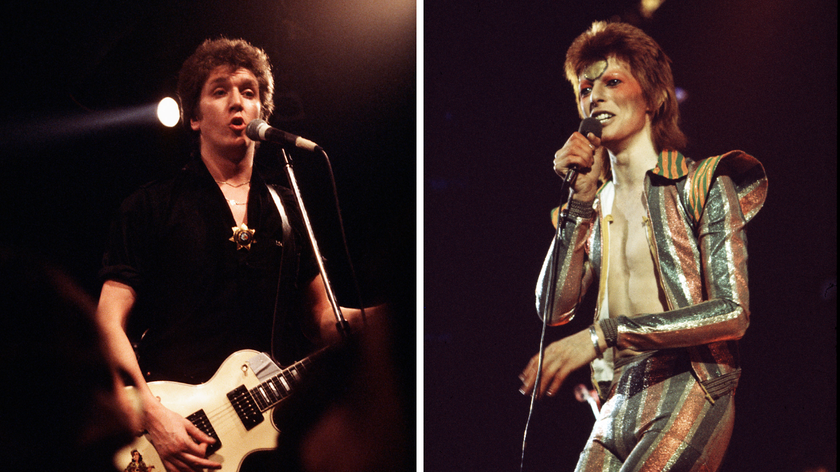
“I nicked some cymbals, the bass player’s amp head and some microphones. I got Bowie’s microphone with his lipstick on it!” On July 3, 1973, David Bowie retired Ziggy Stardust – that same day, Steve Jones stole his equipment










